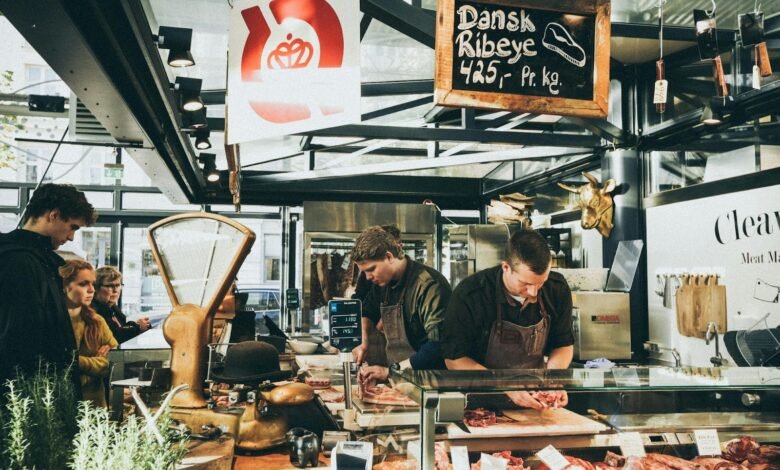Essential Tools Every New Butcher Shop Needs: A Comprehensive Guide

Starting a butcher shop can be a challenging yet rewarding venture. As a hub of culinary expertise, a butcher shop needs to have the right tools for every job. From precise cutting instruments to efficient refrigeration systems, every piece of equipment plays a crucial role in maintaining product quality and customer satisfaction. Below, we’ll explore the essential tools you’ll need to run your butcher shop successfully. Keep reading to ensure that your business is equipped to meet the demands of this specialized market.
Point of Sale Systems: Streamlining Sales and Inventory Management
Efficient butcher shop operations go beyond meat preparation and rely on smart sales and inventory systems. Modern point of sale (POS) systems help streamline transactions, track sales in real time, and manage stock levels automatically. This prevents overstocking or shortages and gives shop owners valuable insights into product trends and customer preferences.
Many POS systems now integrate with VoIP solutions, improving communication with staff, suppliers, and customers. This boosts productivity and enhances customer service by speeding up order processing and fulfillment. Easy-to-use, customizable POS tools also generate detailed sales reports, helping butchers make better financial decisions and adjust pricing or promotions to boost profits.
See also: Launch Your Dream Business with Limited Funds and Unlimited Imagination
Essential Cutting Equipment for Butcher Shops: Knives, Saws, and Cleavers
The cutting area is central to any butcher shop, requiring sharp, reliable knives for precise meat preparation. Butchers use a range of specialized knives, such as boning, carving, and skinning knives, each suited for specific tasks. High-quality, sharp blades improve both efficiency and safety.
Meat saws, whether manual or electric, are essential for cutting through bone and large carcasses, while cleavers handle thicker cuts with ease. Maintaining cutting tools with honing steels and whetstones ensures long-lasting performance and precision. Protective gloves and proper knife-handling training help reduce the risk of injury, making well-maintained, professional-grade cutting equipment a key component of daily butchery work.
Refrigeration and Storage Solutions for Freshness and Compliance
Proper refrigeration is essential in butcher shops to maintain meat safety, freshness, and compliance with health regulations. Commercial units should offer accurate temperature control and enough space to separate meat types, reducing the risk of cross-contamination.
Freezers play a key role in storing surplus stock and extending shelf life, and energy-efficient models help lower operational costs. Strategic layout and easy accessibility of refrigeration units improve workflow efficiency. are vital for maintaining consistent conditions and alerting staff to fluctuations. Display cases must also provide reliable cooling while presenting products attractively, blending visual appeal with proper storage to enhance the customer experience and support sales.
Display Cases and Presentation: Attracting Customers With Visual Appeal
Display cases in butcher shops play a crucial role in sales by making meat products visually appealing through strategic lighting, clear glass, and thoughtful organization. Proper cooling, easy-to-clean designs, and fully stocked, neatly arranged products signal quality and professionalism. Grouping similar meats and using clear signage helps guide customer choices and enhances the shopping experience.
Including educational materials like sourcing details or preparation tips highlights the butcher’s expertise and. The layout of the display area should support a smooth customer journey, encouraging them to engage more deeply with the products and spend more time exploring their options, which can lead to increased purchases.
Sanitization Must-Haves: Keeping Your Butchery Clean and Safe
Sanitization plays a crucial role in butcher shops to prevent contamination and keep meat safe for consumption. A solid cleaning routine should use effective, food-safe detergents and tools that tackle organic matter common in meat processing. Equipment like the Buran Commercial External Vacuum Machine also helps maintain hygiene by sealing meat in sanitary packaging that preserves freshness and extends shelf life.
Cleanliness doesn’t stop with surfaces. Personal hygiene matters too. Employees need access to proper handwashing stations, protective gear, and food safety training. Regular cleaning of work areas, along with frequent equipment checks and maintenance, helps prevent breakdowns and ensures high hygiene standards that earn customer and regulatory trust.
Altogether, outfitting a butcher shop with the proper equipment is critical not just for daily operations but for maintaining high standards of quality, safety, and customer satisfaction. With the right combination of cutting tools, refrigeration units, attractive display cases, sanitization must-haves, and efficient point of sale systems, a new butcher shop can be well-positioned to thrive in this specialized marketplace.







